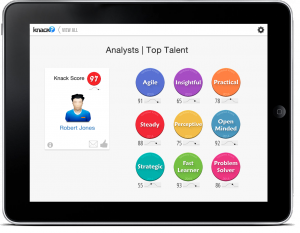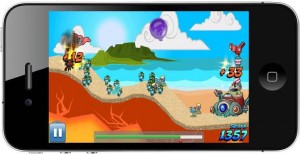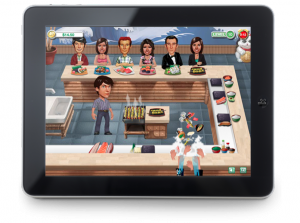 Imagine you’re going in for a job interview. You put on a nice suit, polish your shoes, print out a copy of your resume which lists your many accomplishments and head out the door. You even arrive at the office thirty minutes before your interview just to help make a good impression, you really want this job! After a few minutes of you hanging out in the lobby someone comes to greet you and take you into her office. You both sit down and she offers you something to drink, “no thanks,” you say, “I’m really excited to be meeting with you and think that my background, accomplishments, and personal attributes will make me a real asset here.” Before you have time to explain she takes out a tablet device and says, “that’s great to hear, before we do anything I want you to play a few games, I’ll be back in around forty-five minutes.” One game sees you as a waiter in a restaurant serving food to guests who come in and another game sees you launching balloons at little demons who are trying to attack you. You finish playing both games and the lady walks back in and says, “congratulations, you’re hired.” You just had your job interview playing a game that told the company everything they needed to know about you.
Imagine you’re going in for a job interview. You put on a nice suit, polish your shoes, print out a copy of your resume which lists your many accomplishments and head out the door. You even arrive at the office thirty minutes before your interview just to help make a good impression, you really want this job! After a few minutes of you hanging out in the lobby someone comes to greet you and take you into her office. You both sit down and she offers you something to drink, “no thanks,” you say, “I’m really excited to be meeting with you and think that my background, accomplishments, and personal attributes will make me a real asset here.” Before you have time to explain she takes out a tablet device and says, “that’s great to hear, before we do anything I want you to play a few games, I’ll be back in around forty-five minutes.” One game sees you as a waiter in a restaurant serving food to guests who come in and another game sees you launching balloons at little demons who are trying to attack you. You finish playing both games and the lady walks back in and says, “congratulations, you’re hired.” You just had your job interview playing a game that told the company everything they needed to know about you.
 Meet “Knack“, a new company in Silicon Valley which is changing the way that employers are looking at potential talent. In most job interviews the employer relies on a lot of superficial information like a piece of paper with accomplishments, how the candidate might answer a few questions, how they dress, what they look like, and how they speak. None of these things really give us much depth into the person we are hiring regardless of how clever you want to get with the interview questions. Companies like Knack are giving much greater insight into potential, behaviors, values, and qualities that a candidate might have. These types of games help match the right people with the right jobs.
Meet “Knack“, a new company in Silicon Valley which is changing the way that employers are looking at potential talent. In most job interviews the employer relies on a lot of superficial information like a piece of paper with accomplishments, how the candidate might answer a few questions, how they dress, what they look like, and how they speak. None of these things really give us much depth into the person we are hiring regardless of how clever you want to get with the interview questions. Companies like Knack are giving much greater insight into potential, behaviors, values, and qualities that a candidate might have. These types of games help match the right people with the right jobs.
According to the CEO of Knack, Guy Halfteck:
“Rapid structural shifts are changing the business, economic and demographic landscape and the distribution and availability of high-potential talent around the world.”
The team that designs the games at Knack is comprised of behavioral and data scientists, software and game developers, and game designers and artists. They look at hundreds of variables during game play such as how long you hesitate, what part of the screen you touch, the moves you make, and many other things. In fact they collect multiple pieces of data every mili-second. The result? A list of “Knacks” which are essentially the qualities that make you who you are. I recently played one of their games called “Wasabi Waiter” which had me identify the expressions of patrons as they entered my fictitious restaurant. My avatar had to provide menus, clean dishes, deliver food, and perform a series of tasks to keep the patrons happy and the food coming out. The games can tell you things such as if you are empathetic, risk averse, cool-headed, perceptive, a quick thinker, agreeable, an introvert/extrovert, and a host of other things. In fact the game probably knows the player better than the player knows themselves!
 Any organization would be able to leverage these games to hire people who possess the skills that are ideal for that role. For example if you were an executive at Morgan Stanley MS -2.02% would you want to hire an analyst who is prone to risk or risk averse? If you were running a restaurant would you want someone who was an introvert or an extrovert? If you were running a nuclear science facility would you want someone who is a thrill-seeker or someone who is not perceptive? The challenge today is that it’s not really possible to assess these things from just a few conversations during a job interview. Oftentimes we see two types of errors occurring. Either organizations turn down people who were actually a great fit for the job, or employees are hired who turn out to be a poor fit. What if these types of things could be minimized?
Any organization would be able to leverage these games to hire people who possess the skills that are ideal for that role. For example if you were an executive at Morgan Stanley MS -2.02% would you want to hire an analyst who is prone to risk or risk averse? If you were running a restaurant would you want someone who was an introvert or an extrovert? If you were running a nuclear science facility would you want someone who is a thrill-seeker or someone who is not perceptive? The challenge today is that it’s not really possible to assess these things from just a few conversations during a job interview. Oftentimes we see two types of errors occurring. Either organizations turn down people who were actually a great fit for the job, or employees are hired who turn out to be a poor fit. What if these types of things could be minimized?
We still have a long way to go before these types of games becoming widely used and adopted within organizations but it gives us a sneak peak of the direction that we might be headed. Some companies are already experimenting with these new approaches. The idea of games in the interview process also brings up a host of questions such as: What happens if you don’t have scores for any of the knacks, will you get rejected by the company? Will this completely take out the human component of interviews in the future? How accurate can the data be? Are there issues here around privacy? Will it be possible to “game the games?” All of these issues and I’m sure plenty more, will need to be addressed for many people and companies before this becomes a standard but based on my conversations with Guy, their CEO, it seems like they are thinking through all of these things.
These is also still something to be said for the human interaction and the “vibe” we get from someone when we meet them. Relying solely on games to help companies select candidates is still premature yet evolving. But imagine combining the interview process of meeting and speaking with someone with the information that a game like “Wasabi Waiter” can reveal. Now all of a sudden you have a very powerful combination.
There are all sorts of possibilities for where this can go. Everyone who uses Knack will have a unique Knack footprint. People can display their knacks, follow business leaders that have certain knacks, connect with other people who share the same knacks, and figure out what they have a knack for—at work, at school and beyond. These games are also just begging for a social networking component such as a tie in to Facebook, Linkedin, and Twitter that allows people to share and showcase their knacks.
Knack is still in the early stages with a big vision but the potential for something great and game changing is certainly there.
